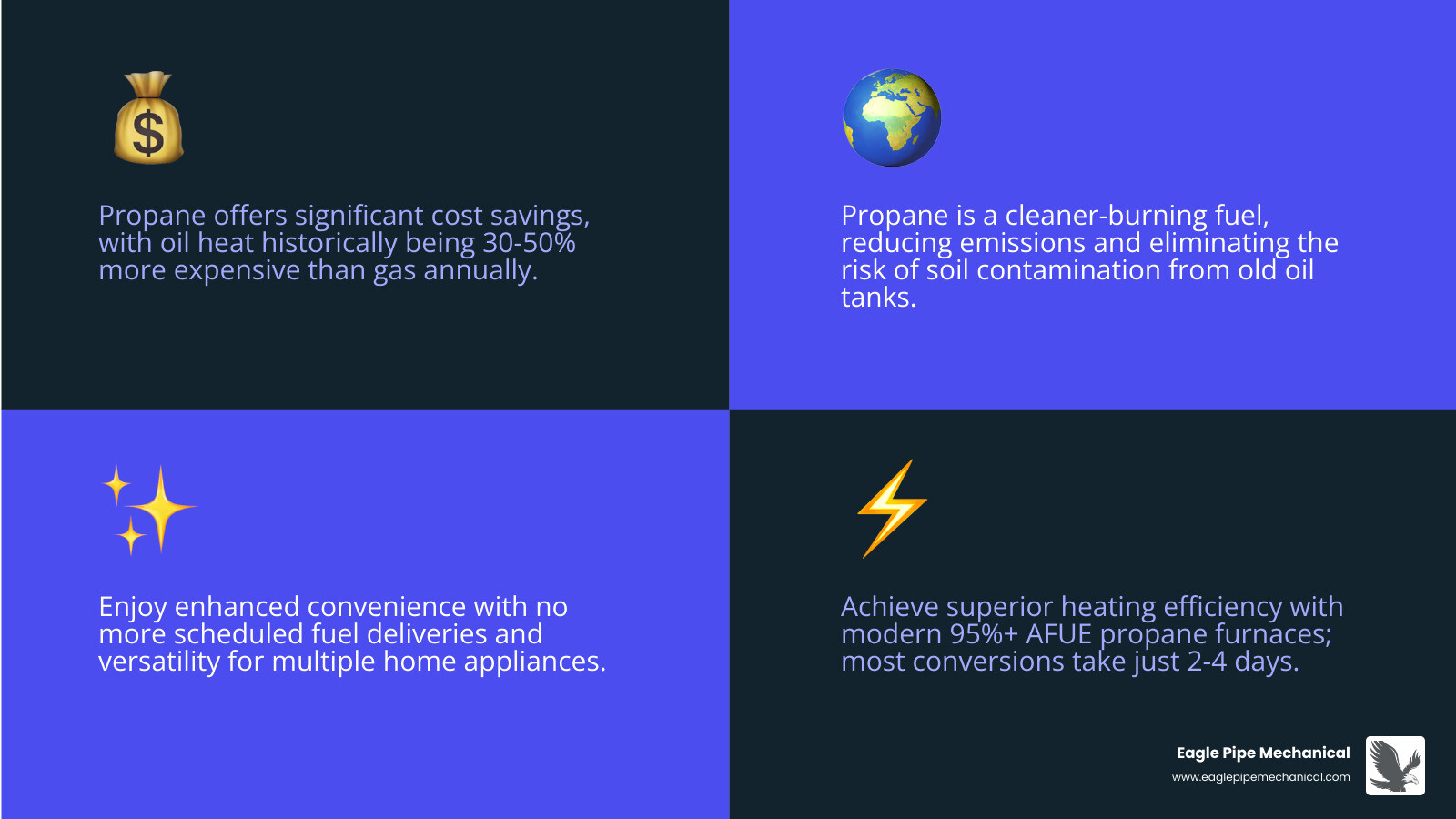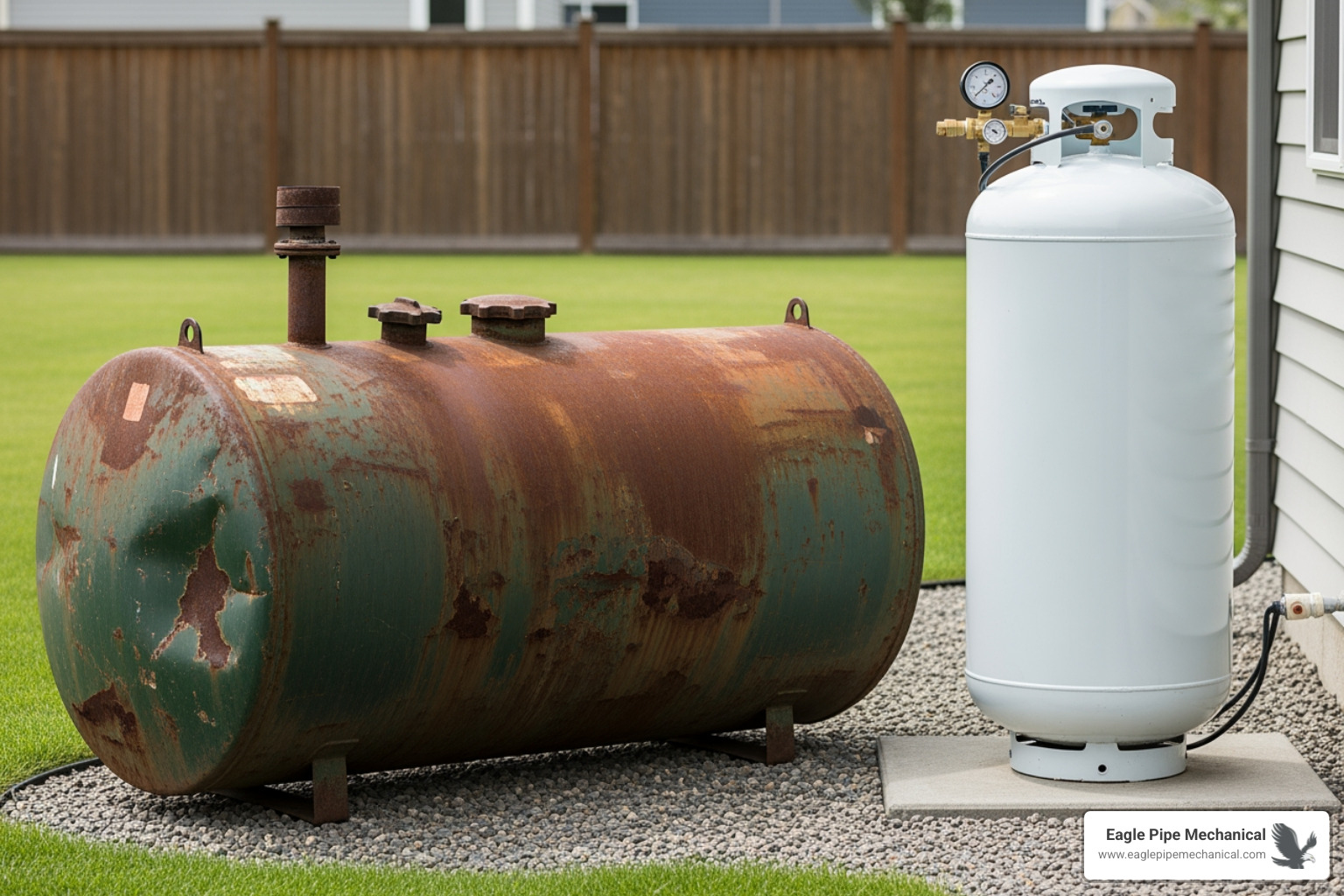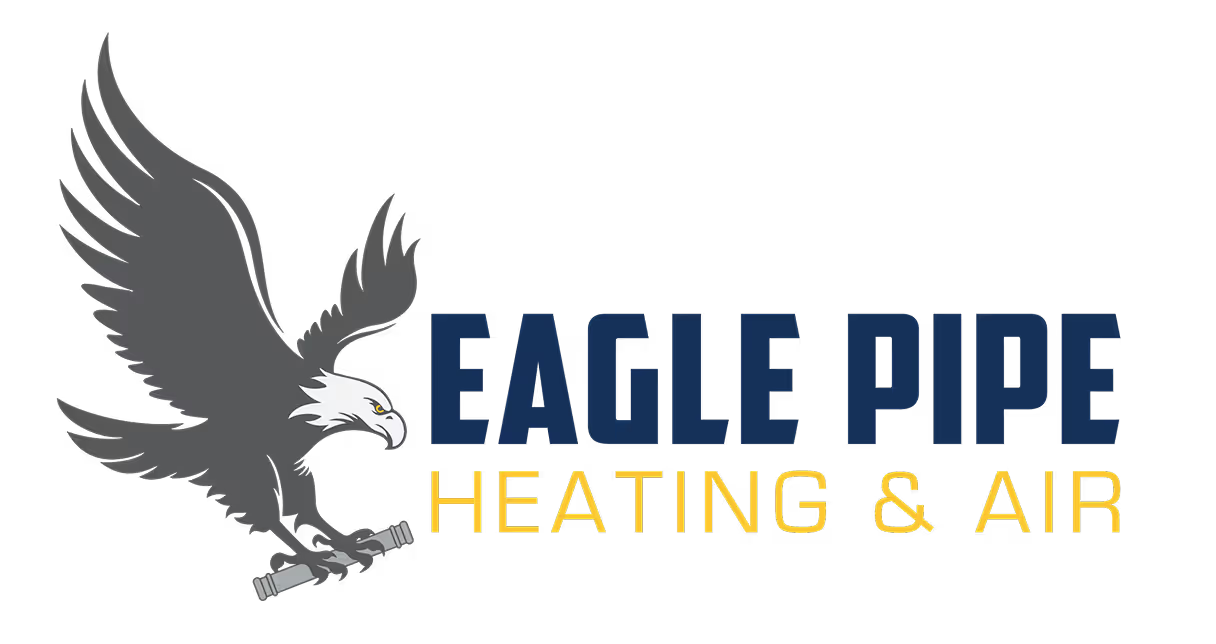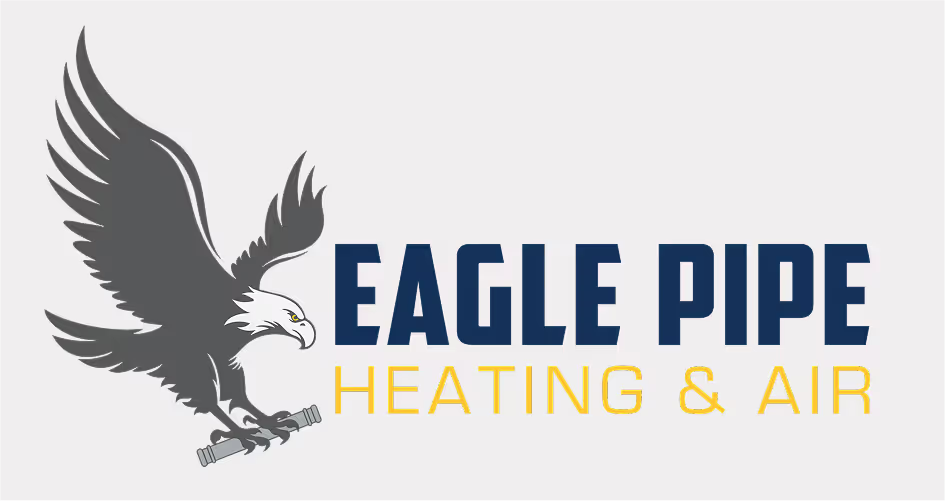From Oil to Propane: A Greener Heating Alternative for Your Home

Why Bainbridge Island Homeowners Are Choosing Cleaner Heat
Oil to propane conversion Bainbridge Island is becoming a popular choice for homeowners looking to cut heating costs, reduce their environmental impact, and simplify their fuel delivery. If you're tired of expensive oil deliveries, worried about tank leaks, or simply want a cleaner burning fuel for your home, converting to propane offers a practical solution. Many island residents are making the switch to take advantage of propane's efficiency, versatility, and lower emissions—especially as heating oil costs continue to climb and environmental awareness grows across the Puget Sound region.
Quick Overview: What You Need to Know About Oil to Propane Conversion
- Cost Savings: Oil heat has averaged 30-50% more expensive than gas heating every year since 2002
- Cleaner Burning: Propane produces fewer emissions and eliminates risks of soil contamination from leaking oil tanks
- Greater Convenience: No more scheduling fuel deliveries or worrying about running out mid-winter
- Versatility: Once installed, your propane line can power water heaters, ranges, fireplaces, and outdoor grills
- Efficiency: Modern propane furnaces achieve 95%+ efficiency ratings, far exceeding most older oil systems
- Timeline: Most conversions take 2-4 days from start to finish
If you're considering upgrading your home's heating system, learn more about our safe gas line installation services. Ready to get started? Contact Eagle Pipe Mechanical for a conversion consultation.
The conversion process involves removing your old oil tank and furnace, installing a new propane tank and gas lines, and connecting a high-efficiency propane heating system. While the upfront investment requires planning, homeowners typically see the benefits in lower monthly heating bills, increased home value, and peace of mind knowing they've eliminated the risk of costly oil spills.

Why Bainbridge Island Homeowners Are Making the Switch from Oil to Propane
If you've been heating your Bainbridge Island home with oil for years, you're not alone—and neither are the growing number of neighbors who've decided to make a change. Across Kitsap County, homeowners are finding that switching from oil to propane isn't just about upgrading equipment; it's about embracing a heating solution that saves money, protects the environment, and makes daily life a whole lot easier.
The reasons behind this shift are pretty straightforward: people want lower heating bills, they care about their environmental impact, and they're tired of the hassles that come with oil heat. We've worked with dozens of island families through this transition, and we've seen how much of a difference it makes.
The Financial Case for Conversion
Let's be honest—your heating bill probably isn't your favorite piece of mail each month. That's where the financial argument for oil to propane conversion Bainbridge Island gets really interesting. Since 2002, heating oil has consistently cost 30 to 50% more than gas heating every single year. That's not a typo, and it's not a small difference. Over the course of a typical Pacific Northwest winter, those savings add up fast.
But the cost advantage doesn't stop at the price per gallon. Modern propane furnaces are incredibly efficient, with Annual Fuel Utilization Efficiency (AFUE) ratings of 95% or even higher. What does that mean in plain English? For every dollar you spend on propane, 95 cents goes directly toward warming your home. Compare that to many older oil furnaces, which limp along at 60-80% efficiency, wasting a significant chunk of your heating budget up the chimney.
Yes, there's an upfront investment involved—removing your old oil system, installing a propane tank, and putting in a high-efficiency furnace. But here's the thing: those consistent monthly savings mean the conversion typically pays for itself faster than most homeowners expect. The return on investment can be surprisingly quick, and from that point forward, you're pocketing the difference every single heating season.
Environmental and Practical Perks
Money matters, but it's not the whole story. Living on Bainbridge Island means being part of a community that genuinely cares about the Puget Sound environment. Propane helps you live those values every day.
Propane burns significantly cleaner than heating oil, producing fewer emissions and reducing your home's carbon footprint. If you've ever worried about your impact on our beautiful corner of the world, this is one change that makes a real difference. Cleaner air, fewer greenhouse gases—it's the kind of upgrade that feels good beyond just the comfort of a warm house.
Then there's the oil tank issue. If you've got an older heating oil tank, you're sitting on a potential environmental disaster. These tanks corrode over time, and when they leak, they can cause serious soil contamination that's both environmentally damaging and incredibly expensive to clean up. Propane eliminates this risk entirely. The tanks are built tough, and if there ever is a leak (which is rare), propane simply dissipates into the air without harming soil or groundwater.
The practical advantages are just as compelling. Remember waiting around for oil deliveries? Wondering if you'd run out during a cold snap? With propane, your tank is larger and deliveries are less frequent—often managed automatically by your fuel provider. No more playing phone tag with the delivery company or crossing your fingers that you have enough fuel to make it through the week.
And here's a bonus you might not expect: propane systems run quieter than oil furnaces and don't produce those unpleasant petroleum odors. Your home stays comfortable without the background rumble or lingering smell. Plus, once you have propane on your property, you've opened the door to powering water heaters, ranges, fireplaces, and even outdoor grills—all from the same fuel source. It's the kind of versatility that actually increases your property value.

The Oil to Propane Conversion Bainbridge Island Process: A Step-by-Step Guide
If you're wondering what an oil to propane conversion Bainbridge Island actually looks like in practice, you'll be relieved to know it's more straightforward than most homeowners expect. We've guided countless neighbors through this transition, and while it's a significant upgrade, it doesn't have to be overwhelming. With the right team handling the details, you can focus on looking forward to lower heating bills and a cleaner home heating system.
The entire process typically unfolds over just 2-4 days, depending on your home's specific needs and any required inspections. At Eagle Pipe Mechanical, we've refined this process to minimize disruption to your daily life while ensuring every step meets the highest safety and quality standards. Let's walk through exactly what happens during your conversion.

Step 1: Professional Assessment and System Design
Everything starts with understanding your home's unique heating needs. When we visit your property, we're not just measuring square footage—we're getting to know your home. Our certified technicians conduct a thorough home evaluation and perform a detailed heat load calculation, which tells us exactly how much heating capacity your home requires to stay comfortable during those chilly Bainbridge Island winters.
This isn't a one-size-fits-all situation. Your home's insulation, windows, layout, and even which direction it faces all play a role in determining the right system size. We'll discuss your options for choosing a propane furnace, explaining the benefits of different high-efficiency models in plain language. Modern propane furnaces can achieve impressive efficiency ratings of 95% or higher, but finding the right equipment means properly sizing it for your specific needs.
By the end of this consultation, you'll have a clear project estimate and a solid understanding of what to expect. We believe in transparency—no surprises, no hidden details. You'll know exactly what we're recommending and why it's the best fit for your home and budget.
Step 2: Safe Removal of the Old Oil System
Once you're ready to move forward, we begin the careful process of decommissioning your old oil furnace and removing the oil tank. This step requires particular attention to detail and strict adherence to environmental regulations, which is why professional disposal is absolutely essential.
Old oil tanks can be tricky. They've often been sitting in your basement or buried in your yard for decades, and they need to be removed with care to prevent any risk of soil contamination. We follow all local and state guidelines for oil tank removal, ensuring that any residual oil is properly disposed of and the site is thoroughly cleaned.
This is often the step that gives homeowners the most peace of mind. That rusty old tank that's been worrying you? Gone. The potential environmental hazard? Eliminated. We handle all the paperwork, permits, and site cleanup, leaving your property ready for its upgrade. Many of our Kitsap County clients tell us they sleep better just knowing that old oil system is finally out of their homes.
Step 3: Propane Tank and Gas Line Installation
Now comes the exciting part—installing your new propane infrastructure. First, we'll help you decide between an above-ground or underground propane tank. Both options have their advantages, and the choice often comes down to aesthetics, available space, and local tank placement regulations.
Above-ground tanks are typically more affordable to install and easier to service, while underground tanks offer a cleaner look for your property. We'll walk you through the pros and cons of each option, considering your yard layout and preferences. Once the tank location is determined, we handle all the trenching needed to run gas lines from the tank to your home.
Connecting the gas lines to your new furnace—and any other propane appliances you're adding—requires precision and expertise. This is where our commitment to safety really shines. Every connection is tested, every line is properly secured, and everything is done according to code. We take this responsibility seriously because we're not just installing equipment; we're ensuring your family's safety and comfort for years to come.
For a deeper look at how we approach this critical phase, visit our page on safe gas line installation services. Once everything is connected and tested, your new propane heating system is ready to keep your Bainbridge Island home warm and comfortable—more efficiently and affordably than ever before.
Maximizing Your Conversion: Propane Appliances and Local Incentives
Once you've made the switch to propane, you've done more than just upgrade your heating system—you've opened the door to a complete home energy change. Propane is incredibly versatile, and many homeowners are surprised to find just how many aspects of their daily lives can benefit from this clean, efficient fuel. Plus, there may be financial incentives available to help make your oil to propane conversion Bainbridge Island more affordable.
Beyond Heating: Powering Your Home with Propane
Think of your new propane line as an energy highway running through your home, ready to power everything from your morning coffee to your evening barbecue. The beauty of propane is that once it's installed, you can gradually expand its use throughout your home as needs arise or budgets allow.
Propane water heaters are often the next upgrade homeowners consider after heating. They heat water faster and more efficiently than most electric models, giving you endless hot water for those long showers without the guilt of sky-high energy bills. If you love to cook, you'll appreciate the instant heat and precise temperature control of gas ranges and cooktops—professional chefs prefer gas for good reason, and now you can have that same control in your own kitchen.
Your laundry room can benefit too. Propane clothes dryers operate more efficiently than electric versions, drying your clothes faster and using less energy in the process. For cozy evenings at home, a propane fireplace insert offers instant warmth and ambiance at the flip of a switch, without the hassle of hauling wood or cleaning up ashes.
Worried about power outages during winter storms? A propane backup generator keeps your essential systems running when the grid goes down, which is especially valuable here on the island where weather can sometimes interrupt electrical service. And when the weather's nice, propane truly shines outdoors. Outdoor living appliances like built-in grills, patio heaters, and fire pits transform your backyard into an extension of your living space, perfect for entertaining friends and family year-round.
The versatility of propane means you're not just converting your heating system—you're creating a comprehensive energy solution that can improve comfort and convenience throughout your entire home.

Financial Incentives for Your oil to propane conversion bainbridge island
We understand that the upfront investment in an oil to propane conversion Bainbridge Island requires planning, which is why we want you to know about potential financial help that may be available. Washington State and Kitsap County have shown a strong commitment to supporting homeowners who want to make energy-efficient upgrades to their homes.
While many current programs—like the Kicking Gas campaign—have focused primarily on heat pump installations, they demonstrate the state's dedication to helping homeowners transition to cleaner, more efficient heating systems. The Kicking Gas initiative, which has received additional funding from the Washington State Department of Commerce, has already helped over 100 households on Whidbey Island make energy-efficient conversions. The campaign is even working with Bainbridge Island on developing heat pump subsidy programs, showing that local efforts to support energy upgrades are active and growing.
These programs highlight an important point: state grant funds and utility rebates exist to lower the upfront costs of energy-efficient home improvements. While specific incentives for propane conversions may vary over time, we encourage you to explore what's currently available. Tax credits and rebates can make a significant difference in your conversion investment, making cleaner and more efficient heating more accessible for island families.
At Eagle Pipe Mechanical, we stay informed about available programs and can help point you in the right direction. Many qualified HVAC contractors also offer flexible financing options to help spread out the investment over time, making it easier to fit a conversion into your budget without waiting years to start saving on your monthly heating bills.
The combination of long-term energy savings, potential incentives, and financing options means that upgrading to propane is more achievable than many homeowners initially think. It's an investment in your home's future that starts paying dividends from day one.
Long-Term Ownership: Propane System Maintenance and Safety
Once your oil to propane conversion Bainbridge Island is complete, you'll want to ensure your new system operates safely and efficiently for years to come. The good news? Propane heating systems are known for their reliability and longevity. With just a bit of regular attention and some common-sense safety practices, your investment will keep your home warm and comfortable for decades.
Ensuring Longevity: Maintenance for Your Propane System
Think of your propane heating system like a trusted friend—it'll take care of you if you take care of it. The typical lifespan of a propane furnace ranges from 15 to 20 years, often matching or exceeding that of traditional oil systems, especially when properly maintained. That's a lot of cozy winters ahead!
The key to getting the most out of your system is annual inspections by a qualified technician. We can't stress this enough—it's the single best thing you can do to keep your furnace running smoothly. During these routine check-ups, our team will thoroughly inspect all components for wear and tear, clean the burner assembly, and test the ignition system to ensure everything fires up correctly when you need it most.
We'll also carefully inspect all gas lines and connections for any signs of leaks or damage, check and replace air filters to maintain optimal airflow and efficiency, and verify that your thermostat is communicating properly with your system. These simple maintenance tasks not only extend the life of your furnace but also help prevent those dreaded midnight breakdowns when temperatures drop. Plus, a well-maintained system operates at peak efficiency, which means lower energy bills and more money in your pocket each month.
Between professional visits, you can help by changing or cleaning your filters regularly—usually every one to three months during heating season. It's a simple task that makes a big difference in how efficiently your system runs.
Best Practices for Propane Safety at Your Bainbridge Island Home
Safety is our top priority, and understanding how to safely live with propane is essential for every homeowner. The truth is, propane is an incredibly safe fuel when handled properly, and following a few straightforward guidelines will give you complete peace of mind.
Recognizing the smell of propane is your first line of defense. Propane naturally has no odor, but suppliers add a distinctive "rotten egg" or sulfur-like smell to make leaks easily detectable. Familiarize yourself and everyone in your household with this smell. If you ever detect it, treat it as a serious matter and act immediately.
What to do if you suspect a leak: If you smell propane, don't panic, but do act quickly. Immediately evacuate your home—don't stop to gather belongings. Once you're at a safe distance, call your propane provider or the fire department. Here's the critical part: do NOT use light switches, phones, appliances, or anything that could create a spark while you're still inside. Even the smallest spark can ignite propane gas.
Keeping the tank area clear is another simple but important practice. Make sure the area around your outdoor propane tank stays free of debris, overgrown vegetation, tools, or anything else that could obstruct access or ventilation. Your tank needs breathing room, and you or a technician might need to access it quickly.
We also strongly recommend installing carbon monoxide detectors throughout your home, especially near sleeping areas. While propane burns very cleanly, any combustion appliance can produce carbon monoxide if it's not properly vented. These inexpensive detectors provide an essential safety backup.
Know the location of your main propane tank shutoff valve and make sure everyone in your household knows how to turn it off in an emergency. It's usually located on the tank itself and is clearly marked.
Finally, always rely on qualified and certified professionals like our team at Eagle Pipe Mechanical for any propane system installation, maintenance, or repairs. This isn't the place for DIY experimentation—proper installation and service are essential for safe operation.
By following these straightforward guidelines and scheduling your annual professional maintenance, you can enjoy the comfort, efficiency, and cost savings of your propane heating system with complete confidence. It's really that simple.
Frequently Asked Questions about Oil to Propane Conversion
We know that making the decision to convert from oil to propane comes with plenty of questions. Over the years, we've helped countless Bainbridge Island homeowners through this process, and we've heard just about every concern and curiosity imaginable. Here are answers to the most common questions we receive about oil to propane conversion Bainbridge Island projects.
How long does the conversion process typically take?
One of the first things homeowners want to know is how long they'll be without heat during the transition. The good news is that most conversions are surprisingly quick. From the moment we begin removing your old oil tank to the final connection of your new propane system, the entire process typically takes 2 to 4 days. The exact timeline depends on a few factors, including the complexity of your particular installation, whether your tank will be above-ground or underground, and any required inspections from local authorities. We work efficiently to minimize any disruption to your daily routine, and we'll provide you with a clear timeline before we begin so you know exactly what to expect.
Is a propane furnace more efficient than an oil furnace?
Absolutely, yes. This is one of the most significant advantages of making the switch. Modern propane furnaces can achieve AFUE ratings of 95% or even higher, which means that 95 cents of every dollar you spend on fuel is converted directly into heat for your home—very little is wasted. Compare that to many older oil furnaces, which often operate at much lower efficiencies, typically somewhere between 60-80% AFUE. That difference in efficiency translates directly to lower fuel consumption and reduced monthly heating bills. It's like upgrading from an old gas-guzzling car to a modern, fuel-efficient vehicle—you simply get more heat for your money with propane.
Are there financing options available for the conversion?
We understand that while the long-term savings are substantial, the upfront investment for an oil to propane conversion Bainbridge Island can be a consideration for many families. The answer is yes—many qualified HVAC contractors, including Eagle Pipe Mechanical, offer flexible financing options to help make this important upgrade more accessible. These financing plans are designed to help you manage the initial costs by spreading them out over time, making it easier to enjoy the benefits of your new, efficient propane system right away. We're happy to discuss the financing options available and help you find a solution that fits your budget. Don't let the upfront cost hold you back from making a smart, long-term investment in your home's comfort and efficiency.
Conclusion
Making the switch from oil to propane isn't just about changing your heating system—it's about investing in a better future for your Bainbridge Island home. Throughout this guide, we've walked through the compelling reasons why so many of your neighbors are making this change: real cost savings that put money back in your pocket month after month, a cleaner environmental footprint that protects the Puget Sound we all love, and the peace of mind that comes from eliminating rusty old oil tanks and unpredictable deliveries.
The numbers speak for themselves. With propane costing 30-50% less than oil year after year, and modern propane furnaces running at 95% efficiency or higher, you're looking at significant savings that continue for decades. But beyond the financial benefits, there's something deeply satisfying about knowing your home runs on a cleaner fuel that won't leak into your soil, that powers everything from your morning coffee to your evening barbecue, and that quietly does its job without the smell and hassle of heating oil.
Living on Bainbridge Island means caring about our community and our environment. Converting to propane is an eco-friendly choice that reflects those values while making your daily life easier. It's the kind of smart, practical decision that just makes sense for island living.
At Eagle Pipe Mechanical, we've helped countless homeowners throughout Kitsap County make this transition smoothly and safely. We understand the unique needs of island homes, and we're committed to providing the kind of knowledgeable, honest service our neighbors deserve. From that first assessment to the final connection, we're with you every step of the way.
If you're ready to explore how oil to propane conversion Bainbridge Island can transform your home heating experience, we'd love to hear from you. Get a quote for your gas line installation and find why so many Kitsap County homeowners trust us for their heating and plumbing needs. Your warmer, cleaner, more efficient home is just a conversation away.
CUSTOMER TESTIMONIALS
Our customers’ experiences say more than we ever could. See how Eagle Pipe Heating & Air has earned trust across the Pacific Northwest with reliable service and lasting results.





